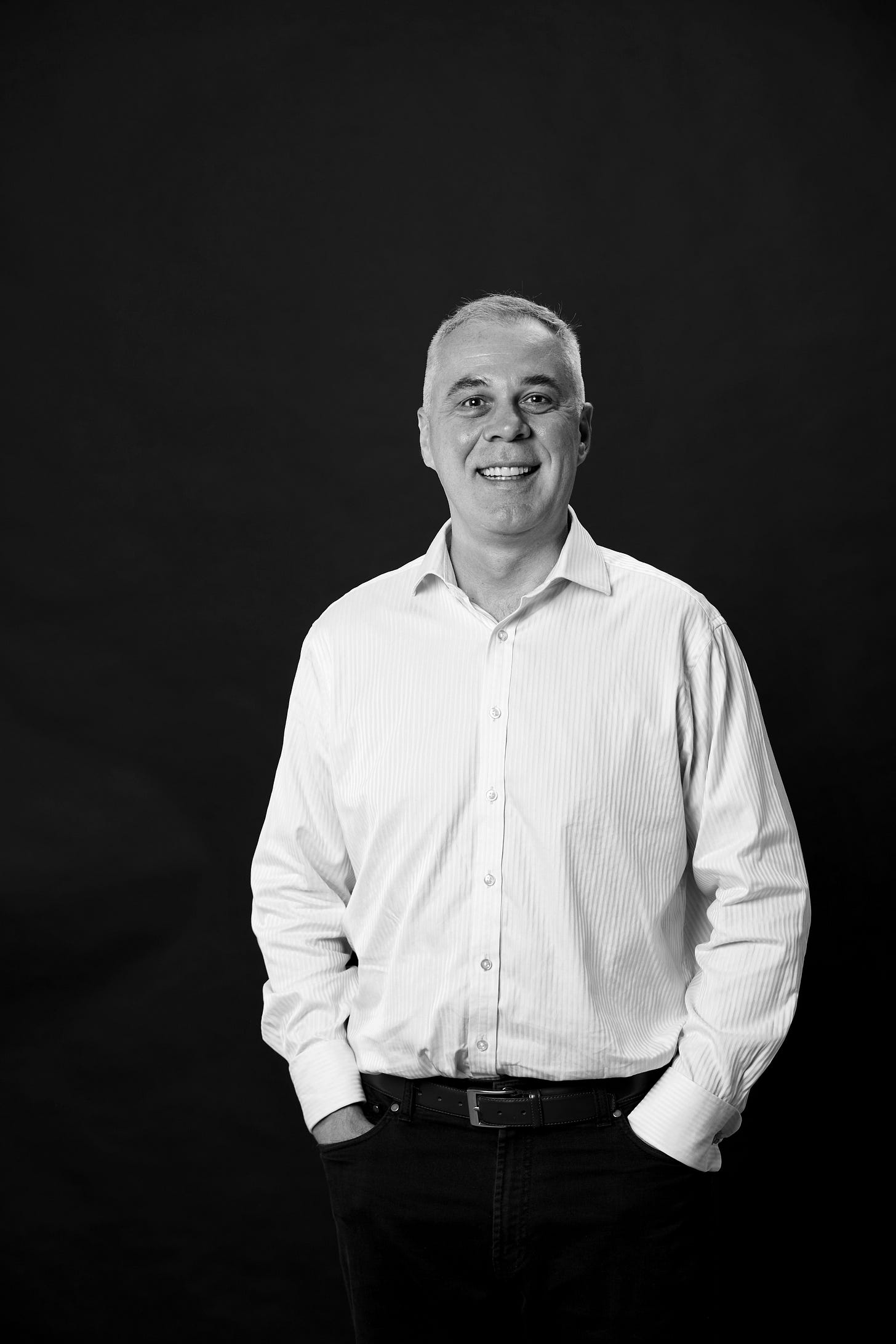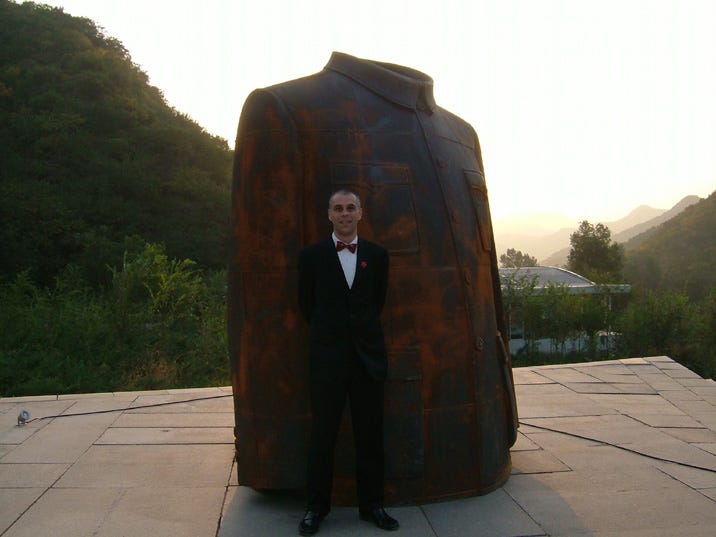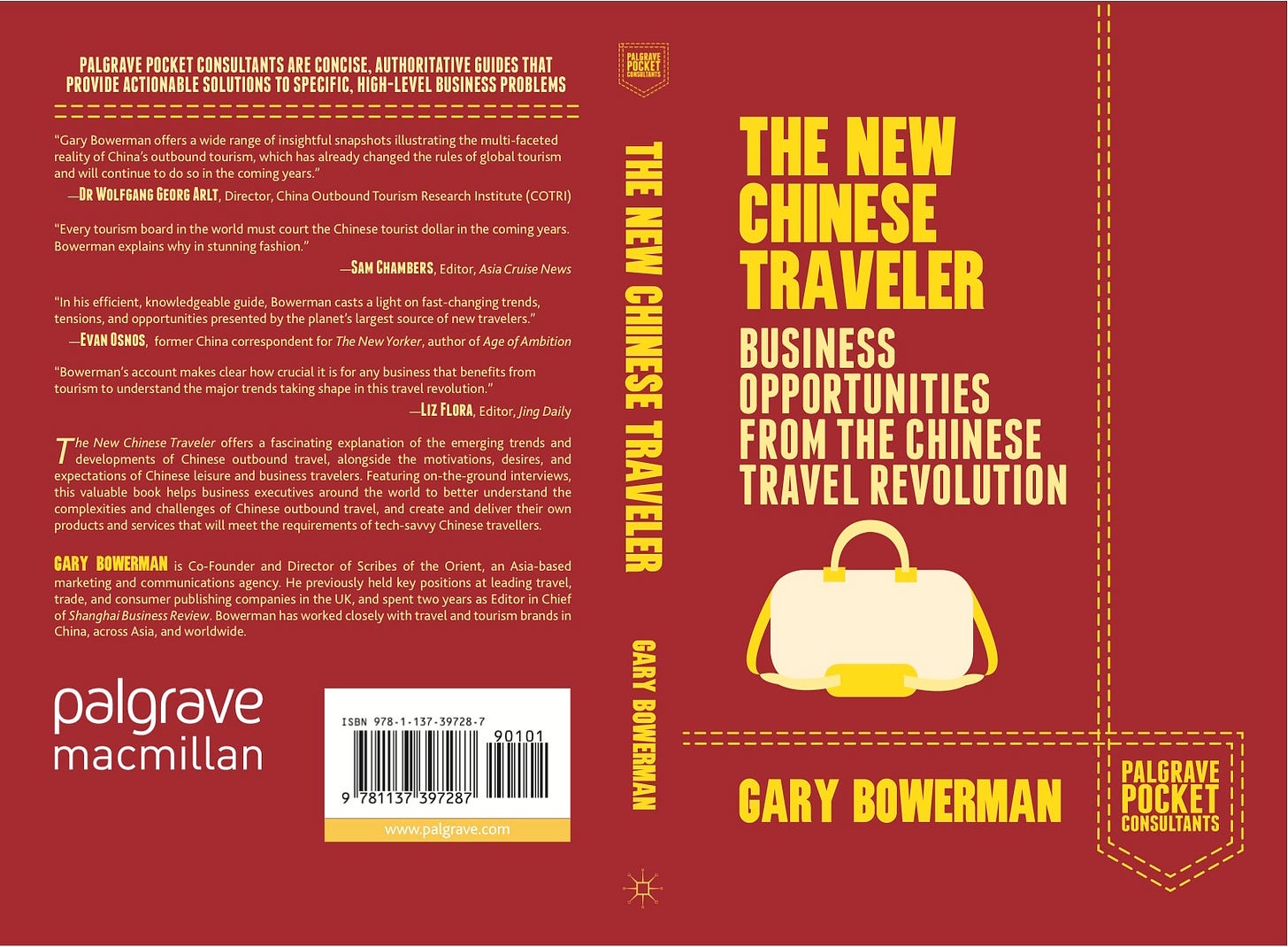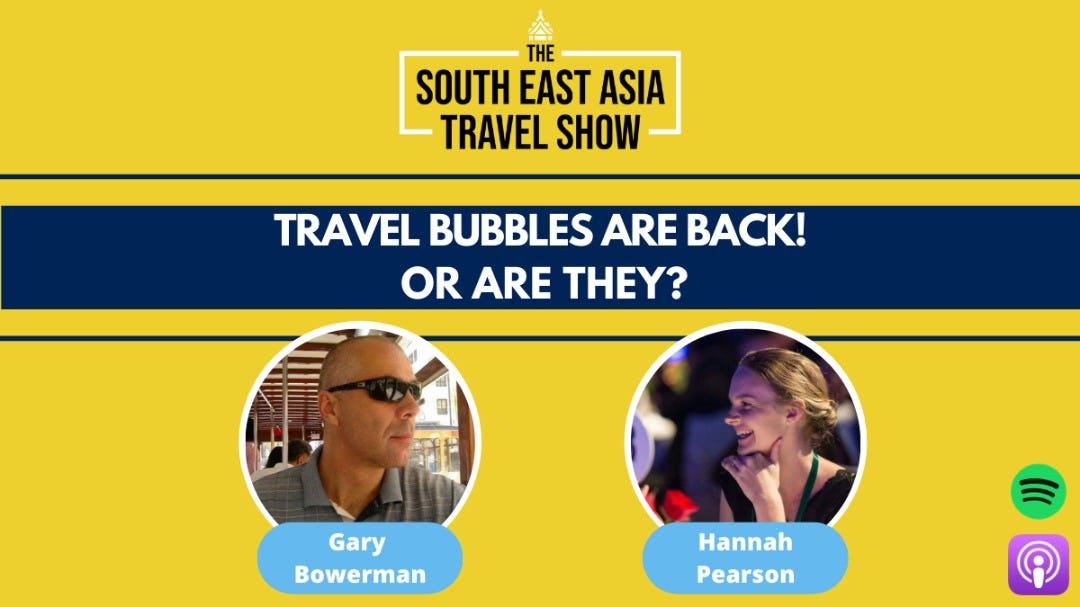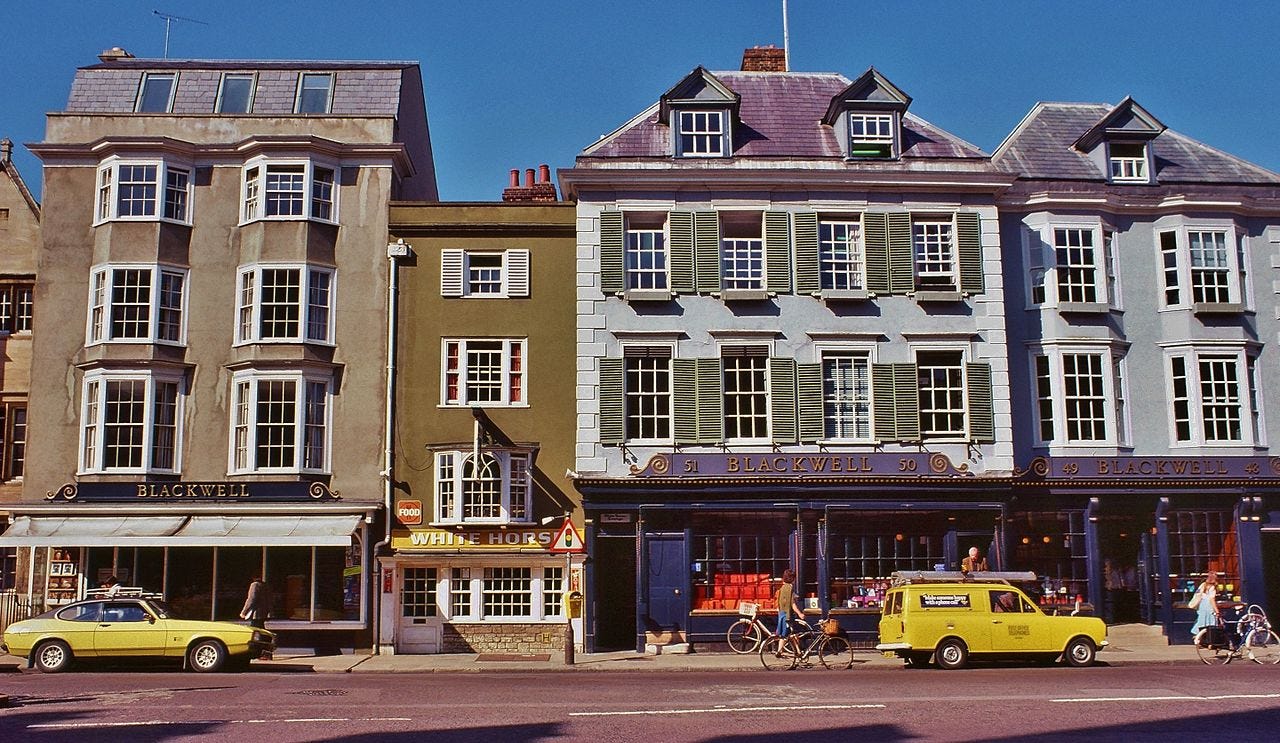The Traveling Man
Meet Gary Bowerman, one of the foremost analysts of Southeast Asian travel, author of a fine book on Chinese travelers, and who once broke his wrist climbing a volcano
Gary Bowerman is the busy writer, researcher, producer, and analyst behind travel newsletter Asia Travel Re:Set and podcast The South East Asia Travel Show. I first met Gary many years ago in Shanghai, where we bumped shoulders frequently on the local media circuit – he was the serious editor-in-chief of the Shanghai Business Review magazine, while I was the wide-eyed galavant about town for that's Shanghai magazine. After I moved to Beijing and set up new magazine Urbane, Gary came onboard as columnist for 'Metropolis', a wide-ranging monthly article where he visited and did a deep dive into the story and urbanity behind some of China's greatest cities (I still miss that column). Since then our paths have diverged but we've both ended up in Southeast Asia – he's settled in Kuala Lumpur, while I have lived in Beijing, Hong Kong, KL, Bangkok (twice), Phuket and now Phnom Penh. However, we both remain invested in travel – or the lack thereof – as its proved this past year. I recently caught up with Gary to ask how it feels to be interviewed instead of interviewing, how KL compares to Shanghai, and what he thinks the future holds for the travel industry.
Let's begin at the start, how did you end up in Shanghai?
Well, a little by accident, really. It goes back to late 2003. I was working in London as editorial director for a travel publishing company. We had a contract with the American Society of Travel Agents (ASTA) to produce their relaunch magazine and the Annual Congress daily magazines. I was spending quite a lot of time in Washington DC, and we’d just managed the ASTA Congress in Miami. Then, my ex-wife. who worked for a global management consulting firm, was offered a two-year secondment to Shanghai, starting in March 2004. We were brought over for a visit in January 2004, and immediately we could see that Shanghai was transforming into a very futuristic city, but one overlaid by its incredible history and heritage architecture. We decided there and then over dinner at M on the Bund overlooking the Huangpu River that we had nothing to lose by trying it out for two years. I ended up staying for nearly six.
How did you find living in China, would you do so again?
Well, Simon we were there at the same time – and it was a mind-rushing time, wasn’t it? That period between 2003 and 2010 was just an incredible time of change and development for China – the outcomes of which we are now seeing on the global stage. Everything was changing. The city was changing. The people were changing. Society, culture and commerce were changing. Certainly, the skylines were changing. It was the era of the 2008 Beijing Olympics, the 2010 Shanghai World Expo. So, there was huge infrastructure development going on, but also the country’s dining, hotel and travel scenes – the media scene we were working in - they just changed 360 degrees.
It was so frenetic, so intense and, frankly, so intoxicating. You and I, we were invited to many openings, parties and events almost every night. Shanghai was truly just a maelstrom of activity, and Beijing too. It felt like a once-in-a lifetime transformation. At the same time, I lived in a remarkable old building, the Blackstone Apartments on Fuxing Lu in the French Concession, which was a faded yet elegant throwback to the mystery and intrigue of 1920s Shanghai. I left in 2010 to move to Malaysia, but living in China was life-defining for me in many ways. I go back occasionally, or I did before the pandemic, but I won’t ever live there again. Those memories are locked in.
You've done many media jobs in media, any favorites?
I think it's quite hard to compare different jobs, even though we are all a little prone to nostalgia. Working experiences help to define specific parts of your life. I particularly enjoyed my two years as editor at Shanghai Business Review. The business environment in China was transforming at a speed that even now seems hard to comprehend. When I joined in 2005, much of the focus was on international companies doing business in China. That altered pretty quickly – and we were able to get inside access at fast-growing Chinese companies – some of which are now global brands. We were lucky to get one of the first interviews for an international media outlet with Alibaba founder Jack Ma. My assistant editor, Tony Lin, had a contact, and he got us in. We put it on the front cover and many people at that time still didn't really know too much about Jack Ma. I re-read the interview again recently, and it is certainly a proud moment.
You were once a researcher for Rough Guides – is there a future for printed guidebooks in our online world?
I grew up in Oxford, which is a publishing city and my mum was a travel agent, so travel and publishing were burned into my consciousness. I was writing and sending articles to travel magazines, but didn't have many connections. I’d spent a year living and traveling in Central and South America, including a few months teaching in El Salvador. When I got back to the UK I applied to all of the travel guide publishers. As it happened, Rough Guides was about to start work on the 2nd edition of its Central America guide. They asked me to research the chapters for El Salvador and Nicaragua.
That was in 1999, and I spent a month traveling in each country, which was immense fun – although I broke my wrist while climbing a volcano in Ometepe. It was the pre-digital era. People actually carried around and read these large, heavy guidebooks. Everything has changed now, because people expect real-time information, and they research and manage all their trips online. I know a couple of researchers who wrote or updated guides before the pandemic, and they'll probably never get published.
What led to your book, The New Chinese Traveler?
When I was working for the American Society of Travel Agents in 2004, we had the global ASTA Congress in Hong Kong. The objective for Hong Kong was to entice more American travelers back because it wasn't long after 9/11 and Americans weren't traveling long haul in large numbers. But during the event, I met a lot of travel agents and tour operators from China, and I got to speak to them and learn about what was happening in the mainland. This was right at the start of their outbound travel surge.
Hong Kong had only recently been permitted to welcome independent travellers from China - firstly from cities in Guangdong, plus Beijing and Shanghai. I had just moved to China, and the travel scene fascinated me from day one. I followed it very closely, and worked with hotels and airlines as China grew into the global travel superpower it is today. Initially these were international companies that were expanding in China, and then later we worked with Chinese travel businesses that were internationalizing. I continued to follow the travel industry’s development through 2010, and attended the Shanghai World Expo, which was probably the world's largest travel Expo in history.
A couple of years later, I had a chat with Paul French, the author and broadcaster, who was working with Palgrave Macmillan to commission a new series of books about business in China. Paul asked if I thought there was mileage in a book about Chinese travel, even though the world was only really waking up the potential. He hooked me up with the publisher in London, and The New Chinese Traveler was published in 2014.
How has the Chinese traveller changed in the last 7 years?
Perceptions worldwide about Chinese travellers, and their various trip motivations and inspirations, have evolved considerably since – largely through force of necessity. Destinations worldwide have needed to adapt and transform to meet fast-shifting patterns of travel demand from China. Before I wrote the book, you could see that the Chinese travel market was expanding and diversifying almost daily. But even when it was published, in 2014, there was still a notion that Chinese travelers traveled only in tour groups on package tours. But that's changed now. Every destination around the world dedicates vast resources to tailor its travel offerings to Chinese independent travelers. Every single segment in the Chinese outbound market – from backpacking to super luxury, and everything else in between - has developed at a remarkable rate.
In a nutshell, what is the purpose of Asia Travel Re:Set?
I had the idea for a couple of years. Asia Pacific was the engine of global travel before the pandemic, and will be again. But it is a vast region with a huge diversity of issues to talk about, so publishing a weekly newsletter when everyone is wondering how travel will reset itself seemed a good time. It’s published every Sunday, and has been going for about 7 months now. I get great feedback and some of the articles and comments get picked up by travel publishers and broadcasters, which is pleasing.
Tell me about The Southeast Asia Travel Show podcast
I'd had the idea for a podcast discussing South East Asia travel and tourism for about two years, but hadn’t pushed it forward. I have always listened to podcasts, and wanted a format that enabled discussion in an informed but casual way. South East Asia is a dramatically diverse and very interesting region for inbound, outbound and domestic travel - but many of the critical issues weren't really getting discussed in much detail.
Like me, Hannah [Pearson, co-host] has lived in KL for about a decade, and she also lives and breathes travel. We’d met at a Travel Massive event about three years ago, and connected on LinkedIn. I saw what she was doing in the travel trade side of the business, whereas more of my work was with travel-consumer clients. Anyway, we sat down for a coffee and I told her about the idea. Straight away she wanted to do it. Neither of us had ever produced a podcast, so we started from scratch. We did a pilot in December 2019, and then a month later COVID-19 started spreading across Asia.
By around March 2020 we weren’t sure if we’d be able to continue as the borders in much of ASEAN seemed likely to be closed for a long time. But although COVID-19 has been the dominant theme, there has been so much to talk about – especially with regards to the future of travel, both as concept and as an industry. We’ve interviewed some interesting people, and have listeners in more than 50 countries, so it’s been very rewarding – and we still manage to find enough to talk about to make a weekly show.
In your opinion, how has COVID impacted travel globally?
Over the last year, travel and tourism have never been written and spoken about so much even though borders have been closed and very few people are travelling. It has become evident just how vital travel, tourism, aviation and hospitality are to national economies and the livelihoods of millions of people. Personally, I don't think travel will ever be the same again. The travel industry keeps looking for clues for when travel activity will return to 2019 levels. But whenever we do get back some of the travel freedoms we once enjoyed, I think travellers will be psychologically scarred – not just by the pandemic that has occurred, but also the possibility of another one taking hold.
COVID-19 has had a hugely devastating effect across the entire travel industry – on airlines, hotel groups, travel agents, backpacking hostels, small restaurants in rural communities, and, of course, the people who work – or worked – in all of them. No-one likes to say it, but I think it’s in the back of many people’s minds that the dramatic changes cementing themselves now mean global travel may never be the same again.
Do you have a preference for the written or spoken word?
That's a really good question – and not one I’d not considered much until now. I grew up in Oxford, which is a publishing city, a city of learning and academia – of Tolkien, Carroll and CS Lewis, and Blackwell’s bookshop. Unlike many cities in the world, students still read books in pubs. So, as a kid, I was absorbed by the written word. I loved literature and language, but also economics and sociology. From a young age, I wanted to be a journalist, an editor, a writer – any of these, all of these. I still love writing, but I enjoy broadcasting too – and writing broadcast content – and doing interviews. I’m very lucky, and it’s very pleasurable to be to be able to do them all.
When you’re able, where do you plan to travel to first?
Like many people who live overseas from their families, my first trip will be to see my mum and dad in Oxford. But after that the country that keeps calling me back is India, which is a remarkable nation in every way. I am a big cricket fan, so I’d loved to have been there to see the recent India v England series. Apart from that, I've never been to Russia, so that would be high on my list. And Australia, which is one of my favourite countries in which to travel. In autumn 2019, we did a self-drive trip starting in Perth and touring around parts of South West Australia. That is an honestly magical part of the world – the coastal landscapes are fabulous, and we only scratched the surface.
In three words, sum up what travel means to you
Freedom. Education. Pleasure.




